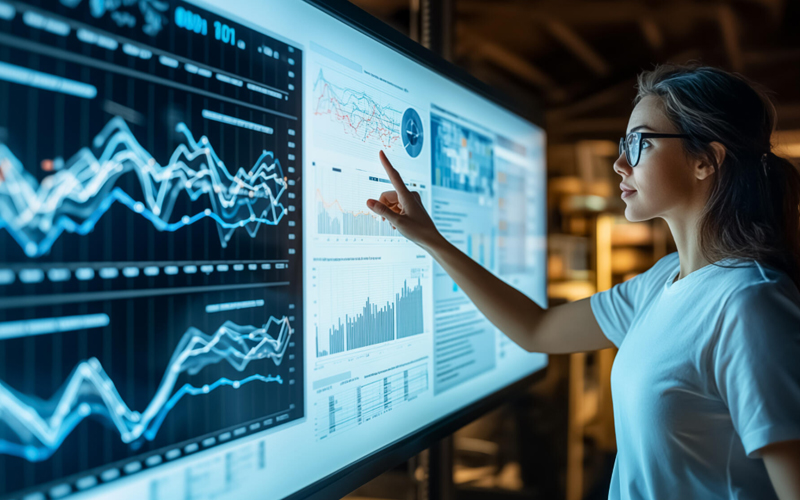Accounting has always been an essential function in business, responsible for managing financial transactions and keeping accurate records. Today, Artificial Intelligence (AI) and digital technologies are transforming the accounting industry in unprecedented ways. These technologies are revolutionising accounting by automating routine tasks, reducing errors, improving accuracy, and increasing efficiency. According to a report by ICAEW, AI can save 16% of the total cost of the finance function, and 88% of accounting professionals believe AI will improve their working lives in the next three years. As per the research conducted by Danish Ali, "The impact of AI in the accounting industry is significant. AI can analyse large amounts of data, extract insights, and automate tasks which were previously time-consuming and resource-intensive."
Before the introduction of technology, accounting functions were highly manual and required significant time and resources to complete. Traditional accounting systems were characterised by repetitive tasks and manual data entry, which were prone to human error. The integration of digital technologies, including cloud computing, automation, and artificial intelligence, has brought about a profound change in the field of accounting. This transformation has resulted in increased speed, enhanced accuracy, and a reduced susceptibility to human errors. Digital technologies have revolutionised the way accounting functions operate, enabling accountants to complete tasks that previously took hours or days, in a matter of minutes.
The disruption caused by new technologies has resulted in accounting functions changing the way they operate.* As per the research conducted by the CMA Exam Academy, "the accounting function has evolved to become more strategic, focusing on data analysis, forecasting, and decision-making rather than just number crunching." These technologies have also enabled accountants to be more proactive in their work, identifying issues before they occur, and providing timely advice to clients.
Another area where AI and technology are transforming accounting is fraud detection and prevention. Traditional auditing methods rely on manual sampling and testing, which can be time-consuming and prone to errors. AI-powered auditing tools can analyse large amounts of data quickly and accurately, identifying anomalies and suspicious transactions. This allows auditors to focus on high-risk areas and potential frauds, reducing the risk of financial loss and reputational damage for businesses.
AI and technology are also changing the way accounting professionals approach financial forecasting and planning. With the help of machine learning algorithms, accounting teams can analyse historical data and make accurate predictions about future financial performance. This allows businesses to make informed decisions about investments, resource allocation, and risk management, leading to greater profitability and long-term success.
In addition to these benefits, AI and technology are also enabling accounting teams to work more collaboratively and efficiently. Cloud-based accounting software allows team members to access data from anywhere, at any time, making it easier to share information and collaborate on projects. This leads to greater transparency, accountability, and accuracy, as everyone is working from the same data source.
While there may be concerns about technology and AI taking away accounting jobs, the reality is that these technologies will enhance and aid in the productivity of accounting teams. These technologies enable accountants to complete tasks more quickly, accurately, and efficiently, freeing up their time to focus on more strategic work such as data analysis, forecasting, and decision-making. This increased productivity can lead to higher profits for accounting firms, as they can complete more work in less time, and provide more value to clients. As per a report by Forbes, "AI and digital transformation are not a threat to accountants; they are the catalysts that will make accountants' work more impactful and strategic."
Future Trends of AI and Technology in Accounting
Looking ahead, it's clear that AI and technology will continue to play an increasingly important role in the accounting profession. Some technology trends that are emerging:
Blockchain technology: Blockchain technology is expected to revolutionise the accounting industry by providing a secure and transparent ledger for financial transactions.
Machine learning: Machine learning algorithms are being developed to improve the accuracy of financial analysis and reporting.
Chatbots: Companies are currently in the process of developing chatbots to assist them with routine accounting responsibilities, such as reconciling accounts and processing invoices.
Robotic Process Automation (RPA): Robotic Process Automation RPA is being used to automate repetitive accounting tasks such as data entry and report generation.
Predictive analytics: Predictive analytics is being used to analyse financial data and provide insights into future financial trends, enabling companies to make data-driven decisions.
Finally, the rise of the Internet of Things (IoT) and the use of smart devices is also likely to impact the accounting profession. With the ability to collect vast amounts of data from connected devices, accounting teams will be able to gain valuable insights into consumer behaviour, market trends, and other key indicators that can inform financial decision-making.
The future of accounting is exciting, and the integration of AI, ML, RPA, blockchain, and cloud computing will continue to transform the accounting profession. From automation and fraud detection to financial forecasting and collaboration, these technologies are making accounting teams more efficient, accurate, and valuable. While some may fear that AI and technology will take away jobs, industry experts suggest that they will augment the role of the accountant, allowing professionals to focus on strategic tasks that add greater value to their organisations.
* For organizations on the digital transformation journey, agility is key in responding to a rapidly changing technology and business landscape. Now more than ever, it is crucial to deliver and exceed on organizational expectations with a robust digital mindset backed by innovation. Enabling businesses to sense, learn, respond, and evolve like a living organism, will be imperative for business excellence going forward. A comprehensive, yet modular suite of services is doing exactly that. Equipping organizations with intuitive decision-making automatically at scale, actionable insights based on real-time solutions, anytime/anywhere experience, and in-depth data visibility across functions leading to hyper-productivity, Live Enterprise is building connected organizations that are innovating collaboratively for the future.








